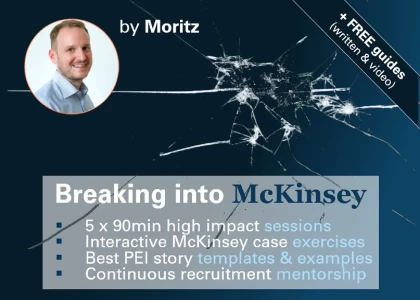Hi All, is there any best practice on how to summarise after interviewer has read the prompt? Is there any recommended flow to it?
Summarising case prompt


I actually have quite a strong opinion about this, which is ultimately a personal preference I have as an interviewer and not grounded in any internal “interviewer guide”.
I do not particularly like it when candidates just “summarize” what they just heard. All this tells me is that they can write really fast and read off their notes. It tells me nothing about their understanding and take on the situation. Most junior people do this and I let it slip because it's not “wrong”, but it is a bit of a waste of time.
Instead, paraphrase what you heard and give me a synthesis of the situation in your own words, focusing on what's important e.g. objective, a particular road block, etc. This way, you show ownership and involvement, maybe some empathy, creativity, personality, conversational ability, etc. Do this and separate yourself from the bulk of average candidates.
Hope this helps a bit! Best of luck!

Most coaches suggest reframing. Some even that you should reiterate the prompt in detail.
My approach is to do neither of the above things.
Reframing or reiterating things that are already clear to you has absolutely no sense, it shows “juniority” and wastes the interviewer's time.
After the prompt, you should clarify whether something is not clear to you and figure out what is the precise goal you have to achieve in the case. Everything else is redundant or junior.

Hi there,
I've never come across any particular rule for this, but what I've always tried doing myself when I was interviewing and what I appreciate when I now interview candidates is: rephrasing the prompt with adding some comments/remarks on the implications of the facts as you go along.
For instance, the prompt might be: “A US grocery chain wants to enter the Indian market …” and your rephrasing might be “our US client wants to enter India, which is a different market from their domestic one, as it is a developing nation and the population density is higher…” .
This approach makes your rephrasing sound less mechanical, more natural and profound, while also getting you in your “thinking mode” . Try this out next time!

Hi there,
I would not overthink this part. I would just make sure to repeat the key points mentioned to make sure you have understood what the case is about.
Especially in times of virtual interviews, there are often misunderstandings during the case, starting with the case prompt.
Cheers,
Florian

Hi there,
Yes, there is.
Aim to start with a synthesis of 1-3 sentences, outlining who the client is, what are they doing and what we are helping them with. This should be the very essence of the case prompt and it helps you as the candidate show to the interviewer that you can distil large amount of data.
After the synthesis you can go through some of the other data points provided by the interviewer as a means to check that you understood them correctly.

Hi there,
You essentially need to paraphrase what you've just heard only pulling out the key items that matter.
So, done throw in every single number read, every contextual piece. Rather, get the main point across with the key hints/clues/business background that matter to really make sure you are clear on where you're there and what the situation is!

Hi there,
Thanks for the question
Candidates often tend to over-index on this part, but there is really no need to complicate - the sequence of what you're trying to do here is quite straight forward:
- Say what you will do (play back prompt) and why (to verify / align understanding) → shows good process control from the start
- Do it: use your on words, i.e. paraphrase AND to summarize, i.e. shorten to 1-2 sentences (don't repeat the whole thing sentence by sentence) - key points is enough!
As long as you keep it crisp and precise, you'll be off to a strong start.
Regards, Andi

Hello!
There is no one good way of doing this, but many options indeed.
Ensure that you have captured the client´s target, since it´s the most key factor in there
Hope it helps!
Cheers,
Clara





